
 i_need_contribute
i_need_contribute

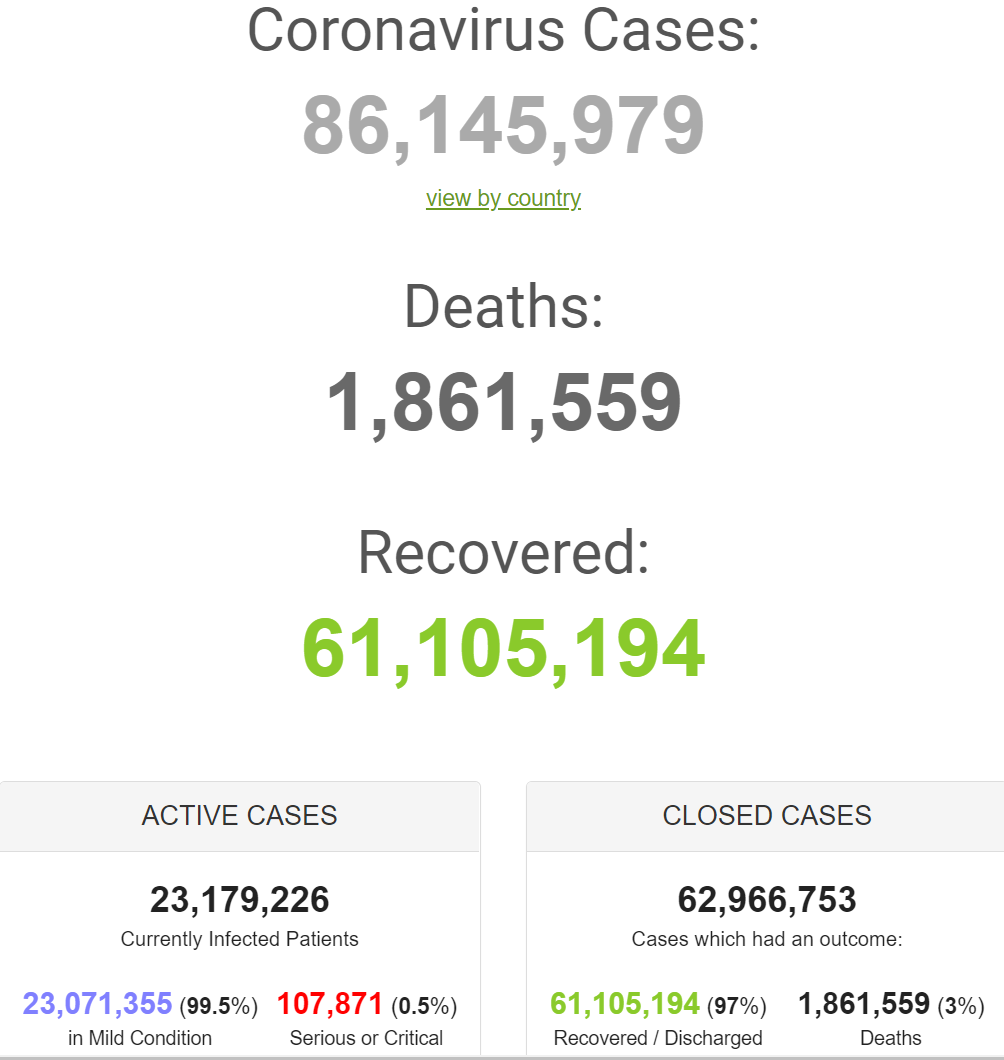
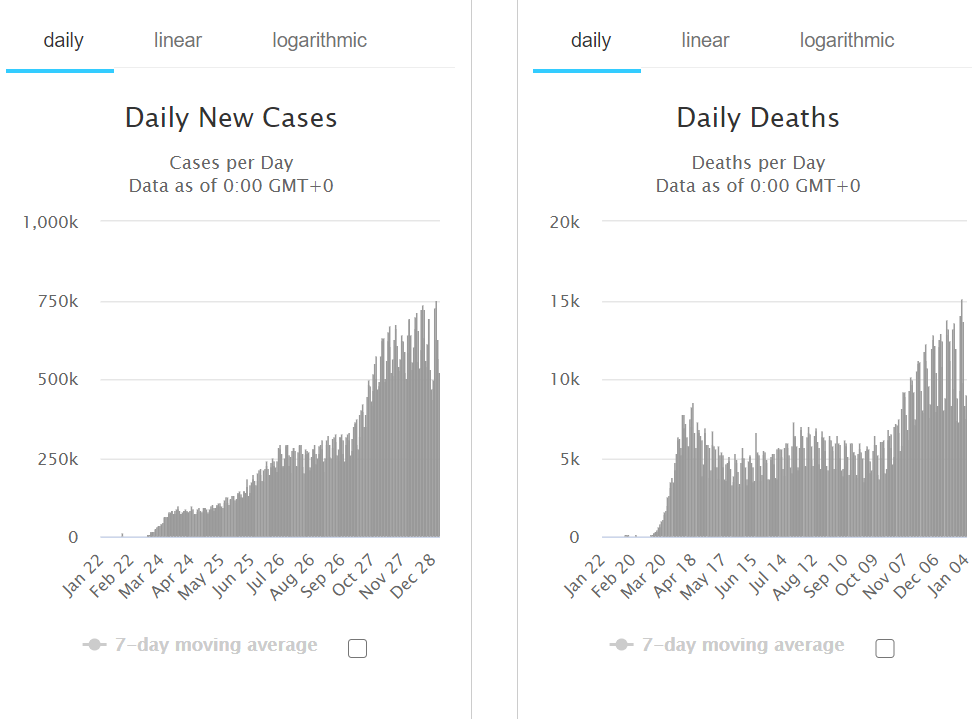
|
Country, |
Total |
New |
Total |
|
World |
86,095,581 |
+535,786 |
1,859,886 |
|
21,353,051 |
+190,165 |
362,123 |
|
|
10,357,569 |
+16,278 |
149,886 |
|
|
7,754,560 |
+20,814 |
196,591 |
|
|
3,260,138 |
+23,351 |
58,988 |
|
|
2,713,563 |
+58,784 |
75,431 |
|
|
2,659,750 |
+4,022 |
65,415 |
|
|
2,255,607 |
+13,695 |
21,685 |
|
|
2,166,244 |
+10,800 |
75,680 |
|
|
1,958,844 |
+9,043 |
51,078 |
|
|
1,796,216 |
+12,056 |
35,632 |
|
|
1,686,131 |
+10,311 |
44,187 |
|
|
1,648,940 |
+8,222 |
43,634 |
|
|
1,448,755 |
+5,211 |
127,213 |
|
|
1,322,947 |
+4,432 |
29,161 |
|
|
1,249,507 |
+6,073 |
55,650 |
|
|
1,113,349 |
+12,601 |
30,011 |
|
|
1,078,251 |
+4,158 |
18,927 |
|
|
1,021,058 |
+1,583 |
37,873 |
|
|
827,726 |
+6,563 |
11,675 |
|
|
772,103 |
+6,753 |
22,911 |
|
|
746,714 |
+6,220 |
12,070 |
|
|
650,011 |
+842 |
19,701 |
|
|
643,559 |
+3,130 |
16,057 |
|
|
620,641 |
+2,450 |
16,767 |
|
|
611,424 |
+9,761 |
16,074 |
|
|
598,369 |
+595 |
12,844 |
|
|
516,929 |
+910 |
7,650 |
|
|
488,529 |
+1,895 |
10,350 |
|
|
478,756 |
+954 |
9,263 |
|
|
448,173 |
+9,304 |
3,445 |
|
|
443,802 |
+656 |
7,538 |
|
|
431,623 |
+4,369 |
7,196 |
|
|
367,410 |
+1,642 |
6,357 |
|
|
363,155 |
+94 |
6,256 |
|
|
346,585 |
+2,715 |
3,364 |
|
|
328,851 |
+856 |
9,977 |
|
|
299,831 |
+1,623 |
3,919 |
|
|
262,262 |
+403 |
1,885 |
|
|
256,230 |
+2,494 |
4,197 |
|
|
243,847 |
+2,893 |
3,599 |
|
|
229,763 |
+594 |
2,628 |
|
|
220,599 |
+334 |
2,761 |
|
|
215,080 |
+466 |
14,069 |
|
|
214,732 |
+1,501 |
682 |
|
|
213,319 |
+361 |
4,126 |
|
|
204,080 |
+1,029 |
7,835 |
|
|
201,831 |
+1,869 |
1,461 |
|
|
192,139 |
+2,861 |
1,512 |
|
|
188,099 |
+636 |
2,521 |
|
|
Dominican |
175,374 |
+2,043 |
2,419 |
|
172,436 |
+717 |
2,229 |
|
|
170,787 |
+2,076 |
1,389 |
|
|
162,661 |
+606 |
9,201 |
|
|
160,220 |
+193 |
2,864 |
|
|
157,579 |
+645 |
2,262 |
|
|
151,715 |
+372 |
938 |
|
|
147,987 |
+1,351 |
1,950 |
|
|
146,309 |
+436 |
3,054 |
|
|
144,796 |
+1,252 |
4,862 |
|
|
144,644 |
+207 |
245 |
|
|
143,464 |
+1,277 |
7,863 |
|
|
142,228 |
+1,009 |
1,490 |
|
|
140,526 |
+427 |
5,011 |
|
|
138,656 |
+181 |
4,835 |
|
|
129,584 |
+180 |
1,502 |
|
|
126,935 |
+590 |
2,744 |
|
|
125,919 |
+297 |
1,950 |
|
|
125,858 |
+772 |
2,838 |
|
|
123,369 |
+225 |
3,180 |
|
|
120,818 |
+1,741 |
501 |
|
|
114,407 |
+177 |
1,038 |
|
|
109,837 |
+764 |
2,305 |
|
|
107,997 |
+6,110 |
2,265 |
|
|
101,975 |
+561 |
1,526 |
|
|
100,645 |
+237 |
2,777 |
|
|
96,908 |
+106 |
1,686 |
|
|
93,766 |
+288 |
352 |
|
|
91,351 |
+1,271 |
1,318 |
|
|
87,150 |
+33 |
4,634 |
|
|
84,129 |
+105 |
2,550 |
|
|
81,388 |
+83 |
1,360 |
|
|
77,258 |
+27 |
614 |
|
|
64,264 |
+1,020 |
981 |
|
|
59,623 |
+185 |
1,199 |
|
|
58,721 |
+24 |
29 |
|
|
51,245 |
+529 |
449 |
|
|
49,630 |
+435 |
692 |
|
|
47,087 |
+284 |
1,364 |
|
|
46,986 |
+67 |
508 |
|
|
6,493 |
+100 |
124 |
|
|
5,606 |
+42 |
49 |
|
|
1,497 |
+3 |
35 |
Retrieved from: https://www.worldometers.info/coronavirus/
From CNN's Stephanie Halasz, Claudia Otto and Nadine Schmidt in Berlin
German Chancellor Angela Merkel will discuss extending a nationwide lockdown with the leaders of her country's 16 states on Tuesday, as the number of Covid-19 infections continue to rise.
The current lockdown, which went into effect in mid-December, is set to expire this Sunday. But the situation in Germany remains “extremely difficult” due to new coronavirus infections, Merkel spokesman Steffen Seibert said.
Seibert said it is also hard to obtain an accurate picture of the pandemic at this point in time because it is unknown how potential holiday travel and gatherings may have affected the situation.
The core of Merkel's discussion with regional leaders will center on the speed of the vaccination process and whether to reopen schools.
The German government has come under pressure from both politicians and scientific experts for not securing enough doses of the Pfizer/BioNTech coronavirus vaccine to roll out its vaccination program.
Merkel is set to meet the premiers virtually at 11 a.m. (5 a.m. ET). She will hold a news conference to announce the outcome in the afternoon.
Caseload and vaccinations: Germany has reported at least 1,787,410 Covid-19 cases, killing at least 35,518 people.
At least 11,897 cases and 944 deaths were identified since Monday by the Robert Koch Institute, the German disease control agency
By Monday, 264,952 people -- or about 0.3% of the population -- had been immunized, according to the institute.
From CNN’s Jake Kwon in Seoul, South Korea
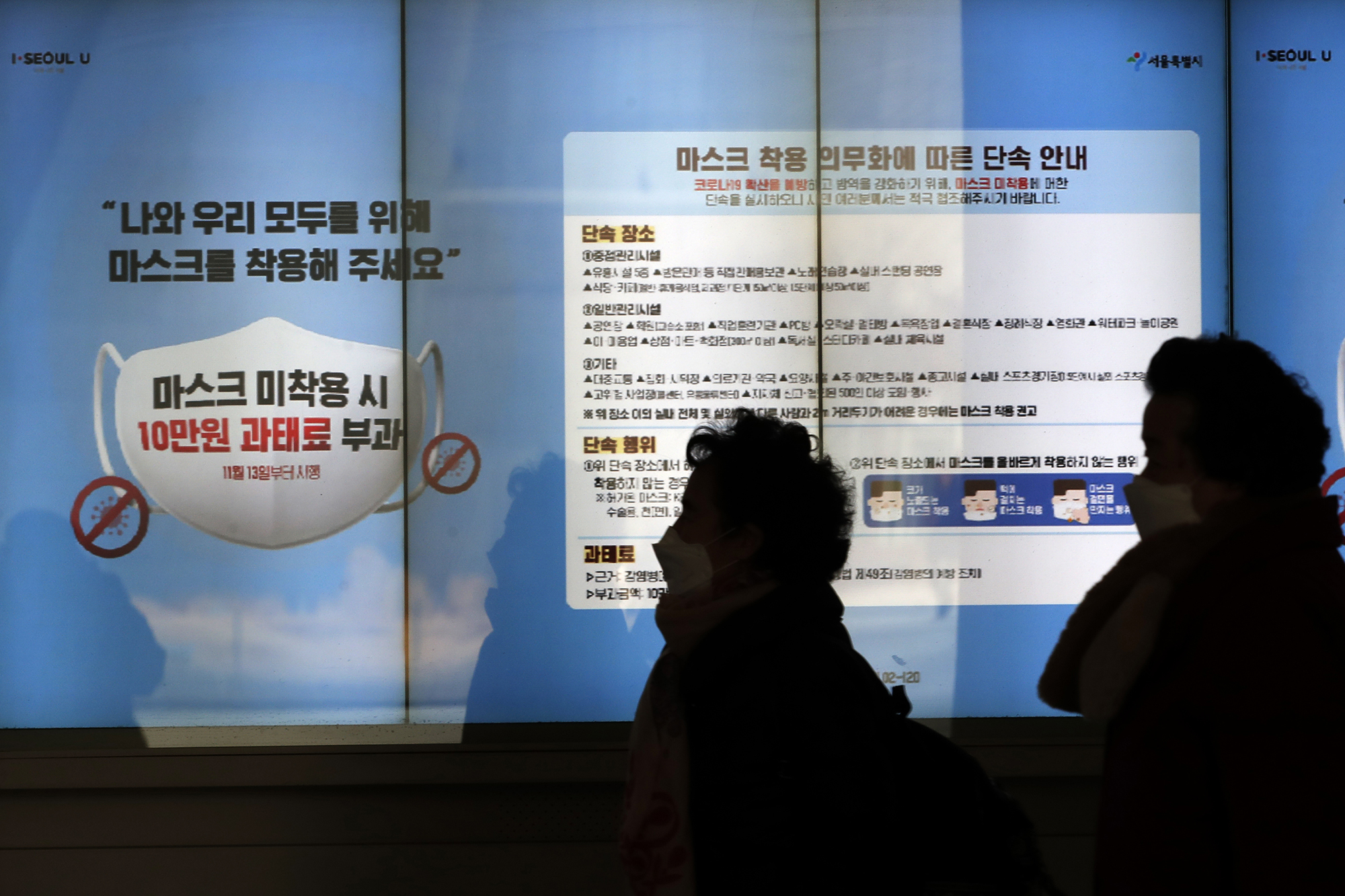
People wearing face masks walk near a screen displaying precautions against the coronavirus in Seoul, South Korea, on Sunday, December 27, 2020. Lee Jin-man/AP
Coronavirus deaths in South Korea have surpassed 1,000, the Korea Disease Control and Prevention Agency (KDCA) said Tuesday.
KDCA said the country reported 26 additional fatalities from Covid-19 Monday, bringing the death toll to 1,007.
An additional 715 cases were also identified Monday -- 455 of which were in the Seoul metropolitan area, according to KDCA. At least 64,979 cases have been confirmed in the country since the pandemic began.
Fighting a new wave: South Korea has long been considered a model country for its effective response to multiple waves of coronavirus, but a new spate of cases this winter has had officials worried.
President Moon Jae-in said this new wave appears past its peak and is slowly being contained. However, Moon said he will maintain the current disease prevention measures to continue to curb the infection rate.
Moon also said that the government will begin vaccination as early as next month.
From CNN’s Tara John, Luke McGee and Nada Bashir
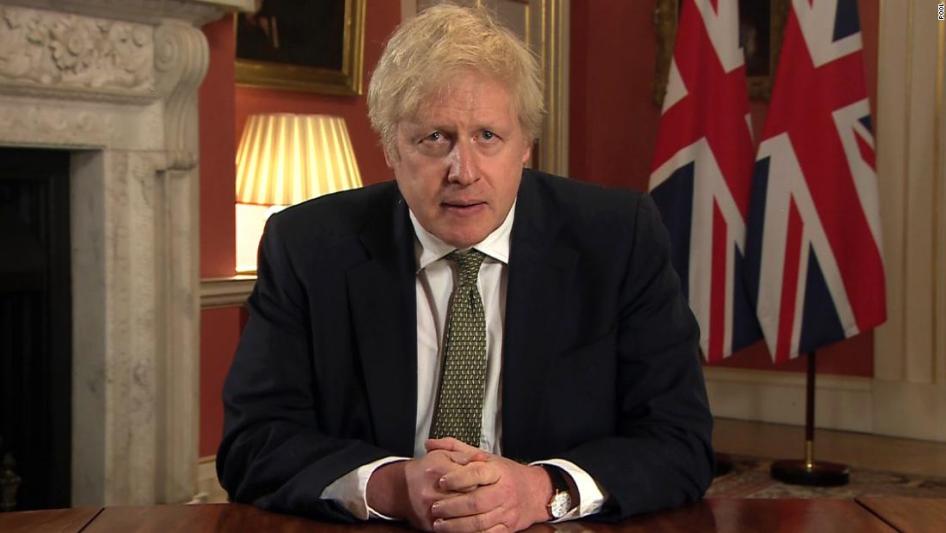
UK Prime Minister Boris Johnson reimposed a lockdown in England on Monday as a more transmissible variant of Covid-19 fuels a surge in infections and hospitalizations in the country.
"It is clear that we need to do more to bring this new variant under control," Johnson said. "That means the government is once again instructing you to stay at home."
During his televised address to the nation, Johnson reimposed measures seen during the first lockdown last spring, including closures of secondary and primary schools to all except the children of key workers and vulnerable children. He added that this means it will not be "possible or fair for all exams to go ahead this summer as normal," and alternative arrangements are being put in place.
People will be allowed to leave their homes for limited reasons like shopping for essentials, exercise, and medical assistance. Johnson also said people could still leave home "to escape domestic abuse" -- an issue that arose earlier during the pandemic, as isolation and lockdown conditions exacerbated barriers to escape for victims of domestic violence.
International departures are now limited to those who have "a legally permitted reason," such as work.
Outdoor sports venues will have to close. But unlike spring's lockdown, nurseries will not be shuttered, elite sports can go ahead, and places of worship will remain open on the basis that attendees adhere to social distancing rules.
The lockdown is expected to remain in place at least through the middle of February.
His announcement follows that of Scotland's First Minister Nicola Sturgeon, who announced a lockdown that will begin on midnight, Tuesday, local time. Wales and Northern Ireland -- the other nations of the UK -- are already in lockdown.
The UK is back in crisis mode as new daily Covid-19 cases soared above 50,000 cases for nearly a week, and hospitalizations exceed April's peak.
From CNN's Jacqueline Howard
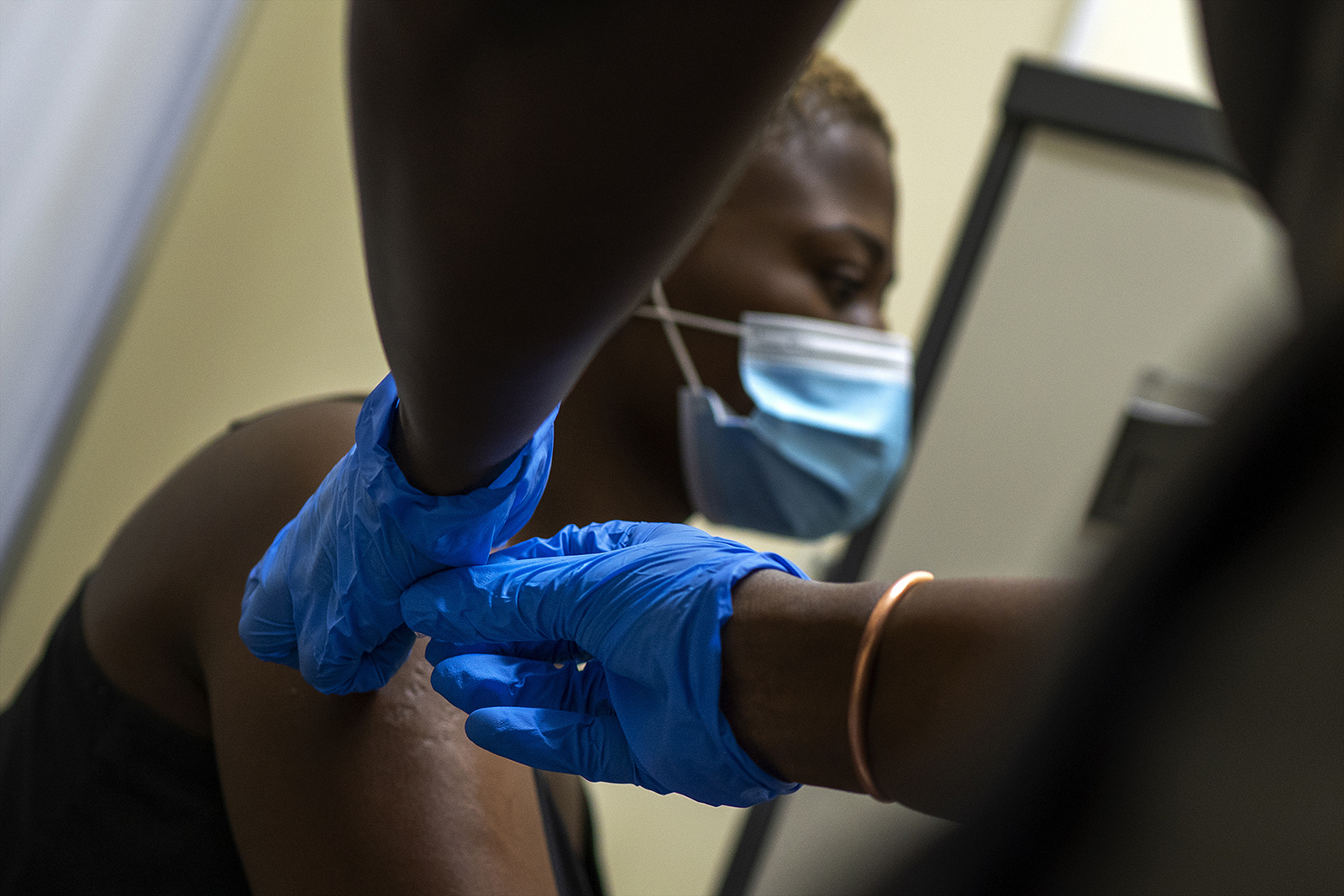
Thabisle Khlatshwayo receives her second shot at a vaccine trial facility for AstraZeneca at Soweto's Chris Sani Baragwanath Hospital outside Johannesburg, South Africa, on Monday, November 30, 2020. Jerome Delay/AP
Scientists in Britain said Monday they are increasingly concerned that that the pattern of mutations in a variant of the novel coronavirus first identified in South Africa may affect the protection offered by some vaccines.
While that variant shares the same N501Y mutation as another variant first identified in the United Kingdom, it also has two other mutations called E484K and K417N. They affect the spike protein -- the part of the virus that attaches to the cells it infects.
Most of the coronavirus vaccines are also designed to train the body to recognize the spike protein, or parts of it, and the fears are that if it mutates too much, vaccines will no longer be as effective.
"These two additional mutations may interfere more with vaccine effectiveness in the South African variant," Dr. Julian Tang, honorary associate professor and virologist at the University of Leicester, said in a statement distributed by the UK-based Science Media Center on Monday.
"This does not mean that the existing Covid-19 vaccines will not work at all, just that the antibodies induced by the current vaccines may not bind and neutralize the South African variant as well as it would the other circulating viruses -- including the UK variant," Tang said.
Lawrence Young, professor of molecular oncology at the University of Warwick, said in a separate statement on Monday that "the accumulation of more spike mutations in the South African variant are more of a concern and could lead to some escape from immune protection."
Meanwhile, scientists are working to better understand the new variant, its mutations and their significance. "Some of the changes are quite significant and thus scientists are paying a lot of attention. We do not yet know enough to say more than this," James Naismith, director of the Rosalind Franklin Institute, said in a statement on Monday.
Maria Van Kerkhove, the World Health Organization's technical lead for coronavirus response, told CNN Sunday that scientists are doing tests to assess the vaccine's efficacy against the variant first found in South Africa, which has 22 mutations.
Retrieved from: https://edition.cnn.com/world/live-news/coronavirus-pandemic-vaccine-updates-01-05-21/index.html
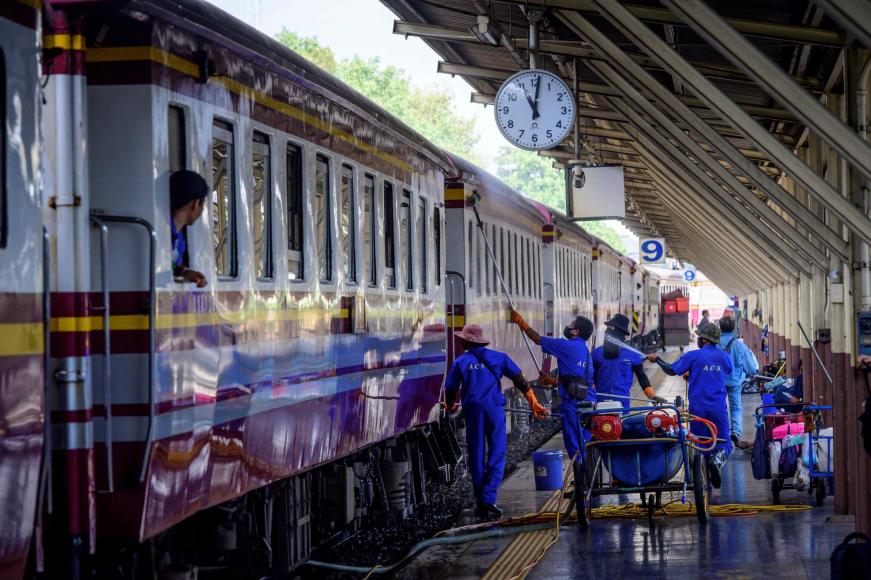
Cleaning and disinfecting at a station in Bangkok on Monday. Health officials in Thailand announced on Monday that there had been 745 new coronavirus cases, the country's highest daily figure since the start of the pandemic.Credit...Mladen Antonov/Agence France-Presse — Getty Images
Thailand, which had been among the most successful countries in containing the coronavirus, imposed wide-ranging new measures on Monday as infections hit a new daily high of 745.
The prime minister, Prayuth Chan-ocha, urged people to stay home but stopped short of calling the new measures a lockdown, which would have prompted government compensation for people put out of work.
In Bangkok, the capital, the government closed schools, bars, entertainment venues and gyms. Employers were urged to allow working from home, but malls and cinemas were permitted to stay open and restaurants were allowed to serve food indoors until 9 p.m.
“This is up to everyone,” Mr. Prayuth told reporters. “If we don’t want to get infected, just stay home for 14 to 15 days.”
The announcement came as Japanese officials considered declaring a state of emergency in Tokyo for the first time since April. The authorities on Monday requested that restaurants and bars close by 8 p.m. to prevent further spread of the virus.
The capital had recorded a record high of 1,337 cases in one day last week, and the local government had already asked residents to refrain from all but essential outings at night. Companies have been encouraged to allow employees to work from home, and universities have been asked to move classes online.
Japan has not yet approved any coronavirus vaccines, but it has contracts to buy doses from Pfizer, Moderna and AstraZeneca.
The country has reported a total of more than 240,000 cases and more than 3,500 deaths, with several record-setting days in recent weeks. Last month, as Japan detected cases of the more transmissible variant of the coronavirus that first emerged in Britain, the government closed the borders to foreign travelers.
Thailand had seen greater success in avoiding outbreaks: Until mid-December, the country recorded about 6,000 cases and 60 deaths. Nearly all new cases were detected in quarantine, which is required for anyone arriving from abroad.
But an outbreak last month at a seafood market in Samut Sakhon Province near Bangkok quickly spread among migrant workers living in close quarters and, from there, to much of the rest of the country.
Of the 745 new cases reported on Monday, 577 were found among undocumented workers.
In China, where life is largely back to normal, “wartime mode” measures have been imposed in several regions in the north of the country, where officials are conducting mass tests, sealing off villages where there have been confirmed infections and limiting entry into certain districts. The health authorities reported 33 new cases and 40 asymptomatic cases, which the country does not designate as confirmed cases, in mainland China on Monday. Beijing has begun vaccinating adults under 60, using the state-backed Sinopharm vaccine.
And on Saturday in South Korea, the government said it would extend until Jan. 17 restrictions in and around Seoul that had shuttered schools, gyms, karaoke rooms, bars and other high-risk facilities. Those restrictions are at the second-highest level of a five-tier system, in a country whose pandemic response was once held up as a model.
Retrieved from: https://www.nytimes.com/live/2021/01/04/world/covid-19-coronavirus/thailand-and-japan-announce-new-restrictions-as-cases-spike
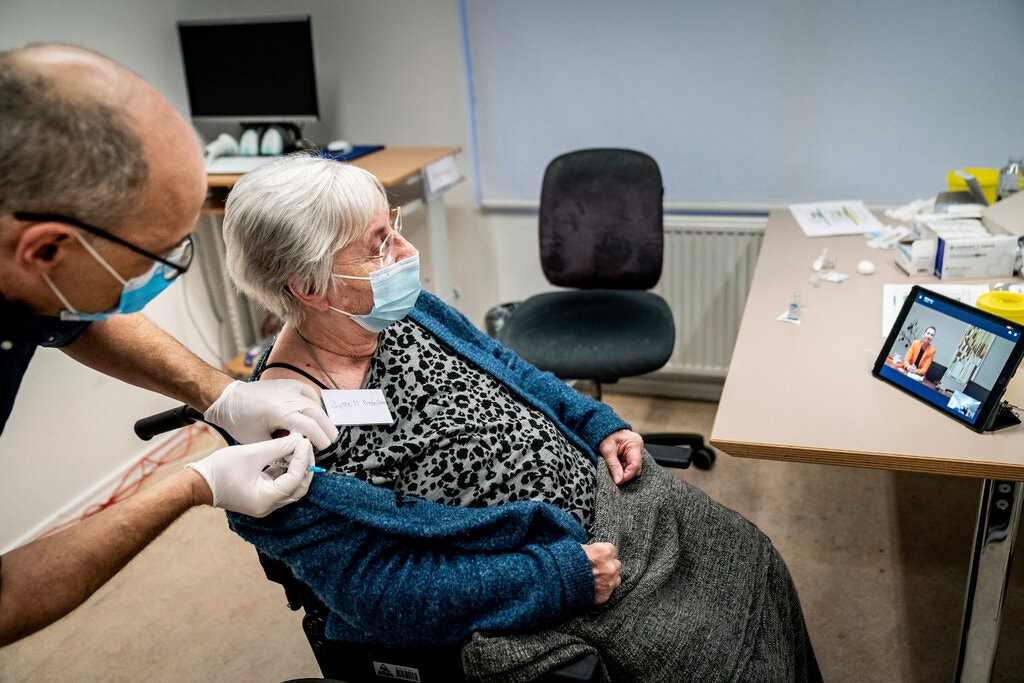
Jytte Margrete Frederiksen was vaccinated in Ishoej, Denmark, on Dec. 27, as Danish Prime Minister Mette Frederiksen watched the via videolink.Credit...Mads Claus Rasmussen/Ritzau Scanpix, via Associated Press
As governments around the world rush to vaccinate their citizens, scientists and policymakers are debating whether to reserve the second doses everyone will need, or give as many people as possible just one shot now — potentially at the expense of giving second doses on schedule.
A number of countries in Europe are considering the options, or moving forward with the delay, despite a lack of evidence about how much protection a single dose of vaccine will provide and how long it will last.
Denmark on Monday approved a lag of up to six weeks between the first and second shots of the Pfizer-BioNTech vaccine, Reuters reported, although the vaccine is meant to to be given in doses three weeks apart. Germany and Ireland are considering similar moves.
Britain last week announced a plan to separate doses by up to 12 weeks. Britain has authorized Pfizer’s vaccine as well as the product developed by the University of Oxford and AstraZeneca, which is meant to be given in doses separated by four weeks.
So far, health officials in the United States have been adamantly opposed to the idea, saying it is not supported by the data gathered in clinical trials.
“The approach some countries are taking of delaying the booster shot could backfire and could decrease confidence in the vaccines,” Moncef Slaoui, scientific adviser of Operation Warp Speed, the federal effort to accelerate vaccines, said on Sunday night.
In the late-stage clinical trial that found the vaccine from Pfizer-BioNTech to be highly effective, participants generally received their seconds shots about three weeks after the first, although data were included from people who received the doses as far as seven weeks apart. In a statement on Monday, the European Union’s drug regulator, the European Medicines Agency, expressed support for sticking to the original plan for spacing the doses of the vaccine. “Any change to this would require a variation to the marketing authorization as well as more clinical data to support such a change,” said Monika Benstetter, an agency spokeswoman.
Since the United States began rolling out authorized vaccines from Pfizer-BioNTech and Moderna, second shots of the vaccines have been sequestered to guarantee that they will be available for people who have gotten their first injections.
Pfizer has also pushed back on the idea of additional lag time. “Two doses of the vaccine are required to provide the maximum protection against the disease,” said Steven Danehy, a spokesman for Pfizer. “There are no data to demonstrate that protection after the first dose is sustained after 21 days.”
The developers of authorized vaccines have reported that a degree of protection appears to kick in after the first shot of vaccine, although it’s unclear how quickly it may wane.
Still, despite a high-level repudiation of the U.K. strategy from Dr. Anthony S. Fauci, the nation’s top infectious disease expert, some scientists believe the United States should consider widening the gap between doses. Proponents of the idea argue that spreading vaccines more thinly across a population by concentrating on first doses may save lives.
On Sunday, Dr. Robert M. Wachter, the chair of the department of medicine at the University of California at San Francisco, and Dr. Ashish K. Jha, the dean of the Brown University School of Public Health, wrote in an opinion piece in The Washington Post that “it’s time to change the plan.”
“The biggest mistake you can make in medicine is anchoring bias,” Dr. Wachter told The New York Times. “You get stuck on what you thought, and you don’t shift with new information.”
The debate reflects frustration that so few Americans have gotten their first doses.
As of Monday morning, three weeks into the vaccination drive, 15.4 million doses of the Pfizer-BioNTech and Moderna vaccines had been shipped across the United States, but just 4.6 million people had gotten their first shots.
The rollout has been bumpy. In Houston, the Health Department phone system crashed on Saturday, the first day officials opened a free vaccination clinic. In Los Angeles, now a center of the pandemic, Mayor Eric Garcetti said that vaccine distribution was moving far too slowly. In New York, Gov. Andrew M. Cuomo said on Monday that hospitals in the state will now face fines and potentially lose the opportunity to distribute the vaccine if they do not step up the pace of inoculations.
But some experts are not convinced that increasing the gap between doses will solve the problems that have slowed the rollout of vaccines in the United States.
“We have an issue with distribution, not the number of doses,” said Saad Omer, a vaccine expert at Yale University. “Doubling the number of doses doesn’t double your capacity to give doses.”
Retrieved from: https://www.nytimes.com/2021/01/04/world/second-covid-vaccine-delay.html
Nyasha Chingono in Harare
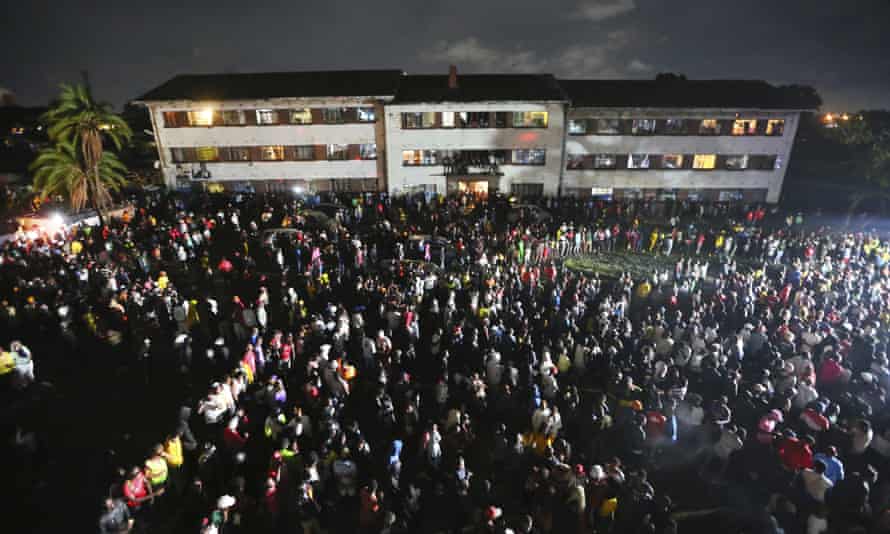
Thousands of people attend a music concert to celebrate the new year in Mbare, Harare, on 1 January 2021. Photograph: Tsvangirayi Mukwazhi/AP
Parties and new year celebrations that attracted thousands of revellers with little social distancing or mask wearing have triggered panic and a strict 30-day national lockdown in Zimbabwe’s capital, Harare.
On New Year’s Eve thousands of people gathered at Matapi, Mbare, one of Zimbabwe’s oldest townships for a dancehall concert, while thousands of others held parties across the city despite a police ban.
Video footage and photographs showing huge crowds partying with no regard to Covid-19 regulations prompted an outcry on social media, with Zimbabweans questioning why the police had failed to shut down the concert. The Mbare event, which attracted top artists, was held less than a kilometre from Matapi police station.
Police have since arrested people involved in organising the unsanctioned concert, for breaking lockdown rules that ban gatherings of more than 50 people.
“So far, 52 people have been arrested … for openly defying the government’s Covid-19 measures on health, safety and security,” police said in a statement.
On the same night, other late-night venues dotted about the city were also crowded with revellers.
Across the country, 2,321 people were arrested on New Year’s Day for breaking lockdown measures, including 200 teenagers at a house party in Westgate, Harare.
“It appears members of the public are taking the Covid-19 pandemic for granted and are no longer taking precautionary measures,” the police said.
The events flouting regulations have triggered panic, with Zimbabweans fearing another wave of the virus.
On Sunday Zimbabwe recorded 774 Covid cases, with 571 new infections in Harare. As of 3 January, Zimbabwe had recorded 15,265 cases and 380 deaths.
However, testing is not widespread and cases have been rising rapidly since Christmas as Zimbabweans who work in South Africa returned home for the holidays.
Health experts have warned of a rapid rise in new infections, especially in the most populous suburbs where social distancing is impossible, while a government official said Zimbabwe could be “overrun by the virus”.
“We hear UK beds are overwhelmed by Covid-19. Well, that’s them. They say in South Africa that hospital admission thresholds are now quite high – that’s them. But, let me tell you about our own situation: don’t catch the virus if you can avoid it. We are being overwhelmed and overrun by this virus,” the information secretary, Nick Mangwana, said in a tweet.
Zimbabweans with relatives suffering from Covid-19 have pleaded for ventilators as private hospitals continue to charge high rates.
With a fragile health system, where there has been insufficient testing and a lack of preparedness to deal with the virus, health experts have warned of an impending health catastrophe.
In response to the rising cases, the government on Saturday ordered a strict 30-day national lockdown.
The vice-president, Constantino Chiwenga, said Zimbabwe had recorded 1,342 cases and 29 deaths in the past week, “the highest number recorded so far”. He ordered that funerals be limited to 30 people while gatherings such as weddings and church services have been banned for 30 days. The reopening of schools has been postponed indefinitely, while restaurants and bars have been shut down. A 6pm-6am curfew has been introduced.
However, airports will remain open, while intercity travel has been banned withborders open only to commercial cargo and vehicles transiting to other countries.
The lockdown also bans any form of informal trading, which is the mainstay of the economy and how millions of people earn get their livelihood.
Zimbabweans who spoke to the Guardian in Harare said the strict rules would plunge families into hunger.
“I used up all my money when I travelled for the Christmas holidays, how do I survive for the next 30 days without selling my wares? These decisions are being made with little regard to how poor people like us are going to survive,” said Esther Marimbire, a vendor from Budiriro, a suburb of southwest Harare.
The 40-year-old said that despite the government’s promises to give struggling families relief during the first lockdown in March last year, her family is yet to benefit. “I was part of the thousands here who registered for relief last year but up to now nothing has come our way. This means the government does not care about our welfare,” she said.
Zimbabwe has nearly 8 million people in need of food aid, according to humanitarian organisations, but recent rains have triggered hope of a better harvest following successive years of drought.
Glen Mutasa, 30, of Glen View in Harare, said his small business would suffer under the lockdown. “From the experience of last year’s lockdown that went on for months, hunger is knocking on my door. I cannot risk running battles with the police and soldiers so I will stay at home, but it’s tough.”
Retrieved from: https://www.theguardian.com/global-development/2021/jan/05/zimbabwe-enters-covid-lockdown-amid-fears-over-crowded-new-year-parties
· The Los Angeles County Emergency Medical Services Agency has told ambulance crews not to transport coronavirus patients who are unlikely to survive – in order to conserve oxygen supplies and ICU beds.
· England has entered its toughest nationwide lockdown since March, with schools closed and people allowed to leave home once a day for exercise for at least six weeks, prime minister Boris Johnson has announced as the numbers of people in hospital reach new highs.
· New York governor Andrew Cuomo said his state has found its first case of the more contagious strain of the coronavirus first detected in the UK, raising concerns about threats to hospital capacity should it spread rapidly.
· Airlines to back approval for global travel testing programme – reports. A group representing major US airlines on Monday backed a proposal by public health officials to implement a global testing programme requiring negative tests before most international air passengers return to the US, according to a letter seen by Reuters.
· Mexico approved the Oxford-AstraZeneca coronavirus vaccine for emergency use Monday, hoping to spur a halting vaccination effort that has only given about 44,000 shots since the third week of December, about 82% of the doses the country has received, AP reports.
· Japan’s top-ranked sumo wrestler Hakuho has tested positive for coronavirus, the Japan Sumo Association (JSA) announced on Tuesday. Mongolian-born Hakuho, who is the longest-serving yokozuna – top-ranked sumo wrestler – of all time announced via the JSA website that he took a Covid-19 test after losing his sense of smell.
· Germany to prolong shutdown as virus deaths surge. German chancellor Angela Merkel and state leaders are expected Tuesday to extend a shutdown in Europe’s top economy as coronavirus deaths continue to mount despite tough restrictions in the run-up to the holidays.